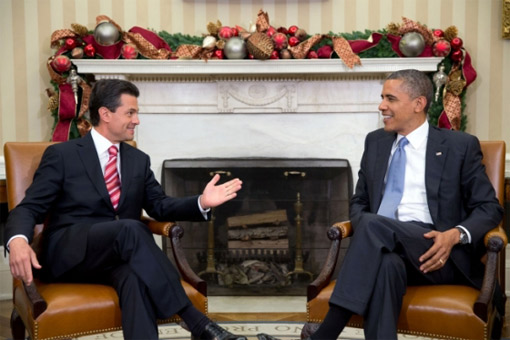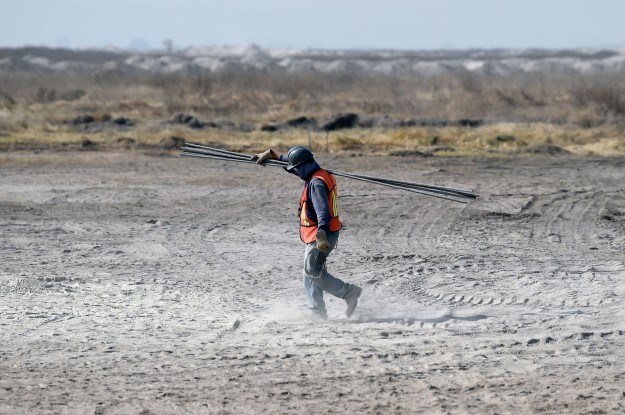In a recent encounter between one of the authors and Arnold Schwarzenegger, long-time actor and former governor of California (2003-2011), he offered a stinging rebuke about California’s neighbor to the south. “When is Mexico going to wake up?” Schwarzenegger opined. “It is with great natural resources and great people. I have filmed movies there and was deeply impressed by the talent of the people. Listen, friend, you have got to stop the violence. You have more potential than Brazil,” he proffered.
This brief exchange underlined the looming challenges for another former governor, Enrique Peña Nieto of the Partido Revolucionario Institucional (Institutional Revolutionary Party—PRI). When Peña Nieto assumes Mexico’s presidency on December 1, he inherits the world’s tenth-most populous country and fourteenth-largest economy. But he also faces the perception of his neighbors to the north that Mexico is a highly violent country. A poll conducted in October revealed that 72 percent of U.S. adults believe it is unsafe to travel to Mexico and 59 percent of respondents believe Mexico is a problem for the United States.
Peña Nieto must reverse this pattern around the world, especially in the United States.
Doing so starts with addressing the reality of violence in Mexico. Conservative estimates by the Instituto Nacional de Estadística y Geografía (National Institute of Statistics and Geography—INEGI) found that insecurity reduces GDP by 1.38 percent, and that 55.3 percent of Mexicans admit to having stopped going out at night for fear of crime. Peña Nieto has pledged to cut the murder rate in half, but to address the root causes, he must usher in a profound reform of law enforcement and the administration of criminal justice. In short, Mexico must be characterized for the first time in its history by the rule of law.
The second challenge is reviving a sluggish economy. Peña Nieto is proposing an ambitious energy reform that will attract more foreign direct investment (FDI), but will not run afoul of Mexico’s constitutional prohibition against selling the nation’s natural resources to foreigners. Peña Nieto has set an ambitious goal of achieving a 6 percent annual growth rate by the conclusion of his term in 2018, and he is rightfully convinced that such growth and the resulting job creation is the only way to reduce poverty in a sustainable manner.
These ambitions draw a parallel between the new chief executive and Carlos Salinas de Gortari, a PRI president from 1988 to 1994 and one of Peña Nieto’s political mentors. In his first year in office Salinas successfully renegotiated Mexico’s foreign debt and positioned Mexico as an attractive, emerging economy. With that, he negotiated the North American Free Trade Agreement. The tragedy of the Salinas sexenio was that other aspects of his modernization of Mexico rested more on public relations than reality, and this was the case for how he combatted organized crime and drug trafficking. Peña Nieto must learn from this mistake and set Mexico upon a firmer foundation.
Engaged Foreign Policy
In international affairs, Peña Nieto’s diplomacy needs to consolidate the leadership that his predecessor, Felipe Calderón, demonstrated in forums such as the G20 and the United Nations Framework Convention on Climate Change (UNFCCC). While maintaining engaged on the world stage, Mexico also must fortify its good relationships with its neighbors to the south and to the north.
In Mexico’s relationship with Central America, the key is to recognize and act on the reality of interdependence; the problems faced by the Northern Triangle countries of El Salvador, Guatemala and Honduras are invariably shared by Mexico. Thus the region must develop a shared vision of how to address issues of development, security and migration.
Peña Nieto should take up the Mesoamerican Project, which replaced Plan Puebla-Panama, and aims to invest in infrastructure and human development and promote regional integration. Also, a coordinated response is necessary to the threat posed by the Zetas, the most violent criminal organization to arise from Mexico and to spread to other Central American nations. Finally, a coordinated and integrated approach is needed to the issue of migration, and Mexico has a moral responsibility to treat Central American immigrants with the same respect that Mexico seeks for its citizens in the United States.
The single most important relationship for Mexico is that with the United States. Most likely Peña Nieto would have voted with the three quarters of Hispanics who supported Barrack Obama’s re-election. With Obama, Peña Nieto has a partner who strives to work in coalitions and to seek regional balance. In terms of the bilateral relationship, Peña Nieto and his team know what to do: put the issues of trade and investment back to the center of the agenda. The Trans-Pacific Partnership is a great opportunity for NAFTA signatories to work in harmony to open new markets in Asia.
Migration and Security
In immigration it is time for Mexico to align its goals with those of the U.S.: both nations will benefit if the U.S. repairs its broken immigration system and provides an adequate framework for orderly, safe and legal immigration moving forward, while finding a common sense solution to the problem posed by the over 5 million undocumented Mexicans in the U.S. today. Given the important role played by Hispanic voters in the U.S. elections, both Democrats and Republicans are publicly endorsing such a reform—although the devil will surely be in the details.
Mexico will confront a harsh reality on the issue of security: the U.S. fiscal crisis will reduce foreign aid to combat organized crime, and it is unlikely that dramatic steps will be taken at any level to reduce the flow of illegal arms across the border. For the last two years Washington has shifted its priorities toward strengthening Mexican law enforcement, and this help is sorely needed. With the recent state-level referenda in Colorado and Washington that decriminalized the use of marijuana, the United States is entering a new phase of internal debate over the efficacy of its prohibition of drug use which will have important ramifications south of the border.
To become governor of Mexico’s largest state at age 40 and president of the country at 46 takes a combination of political savvy and a fair amount of luck. It seems that Peña Nieto is assuming office at a propitious moment for Mexico. In a remarkably bullish appraisal of Mexico’s prospects vis-à-vis emerging economies, The Economist points out that rising labor and transportation costs are weakening China’s position as an exporter to the U.S., and that if current trends continue Mexico could displace China as the number-one source of U.S. imports by 2016.
The title of the article was “Señores, start your engines.” Mexico is hoping that they have put the right man behind the wheel.








